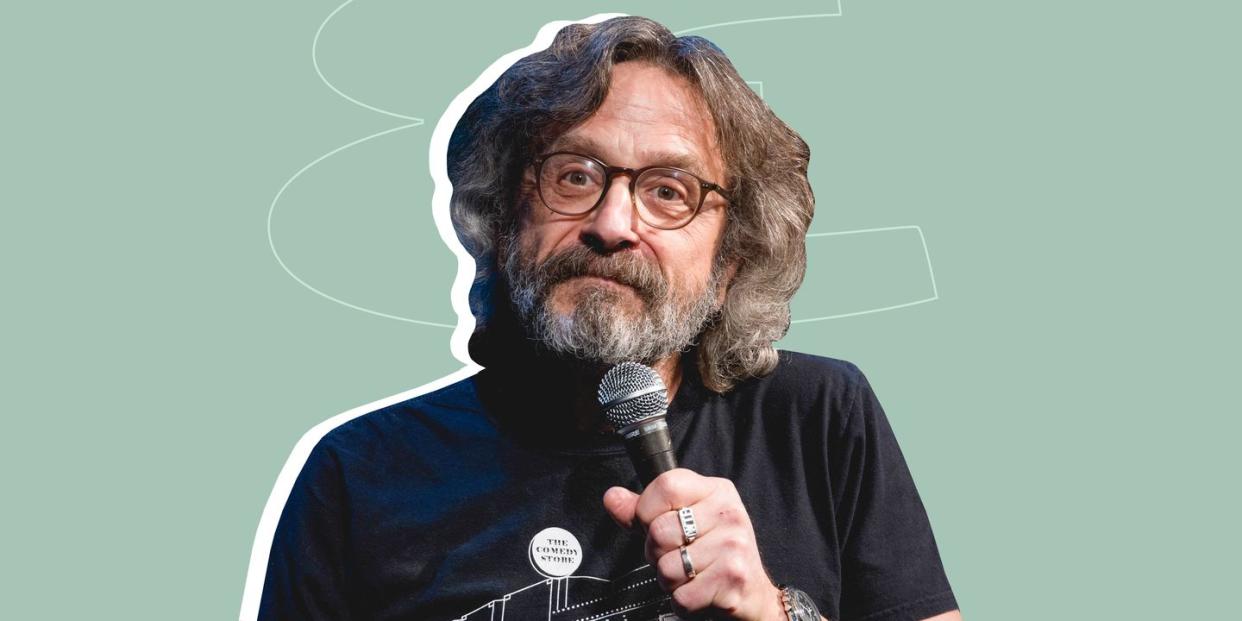Marc Maron Has Triumphantly Reached His F*ck It Phase

- Oops!Something went wrong.Please try again later.
There comes a time in every person's life when they finally decide to say how they really feel. I refer to this as the "fuck it" phase of life. Most women over the age of 65 are in the fuck it phase of life. So is anyone who has recently experienced a life-altering tragedy: a sudden death, an unexpected diagnosis, or a car accident. Ask a person in the fuck it phase of life how they're doing, and you might get back: "terrible," "fucking shitty," "awful, fuck you for asking," or maybe even a blank, depthless stare that says, "I'd murder you if I weren't so hungover right now."
Some of the best comedy comes from people in the fuck it phase of life. For example: Tig Notaro's special, Tig, in which the comedian walks out on stage and immediately says, "Thank you, I have cancer." Or Richard Pryor's Live on the Sunset Strip, filmed after the comedian barely survived setting himself on fire, not to mention the majority of Maria Bamford's specials. Most recently? Marc Maron's new HBO special, From Bleak to Dark, which debuted this past Saturday.
Filmed two-ish years after the sudden death of Maron's girlfriend, the writer and director Lynn Shelton, From Bleak to Dark shows just how transforming tragedy can be. This isn't the same world-weary Marc Maron audiences know and love. Don't get me wrong: he's still a cynical curmudgeon. After all, the first thing he says after strutting onstage and thanking the audience for coming is, "I don't want to be negative, but I don't think anything is ever going to get better ever again." But he's more than that, too. He's both lighter and darker, kinder and yet more caustic, and his jokes are more heartfelt and daring. This is a special about mortality delivered by a man forced to confront it.
For Maron, fuck it mode is a sick burn to optimists: "I think if you have hope, what are you, fucking seven?" It's feeling grateful that your mom gets regular sex from her 85-year-old boyfriend, John. "It takes a load off me…." Maron says, pausing so the audience can anticipate the obvious, incoming joke, "…metaphorically speaking." It's forcing the audience to confront uncomfortable ideas. (Yes, someone can be suffering from Alzheimer's and still be a dick.)
Some of Maron's sharpest work in From Bleak to Dark is his back and forth with the audience about his father, a subject he has touched on before—but never in frank detail. Here, Maron admits to feeling giddy about his father's recent dementia diagnosis. He was a "bipolar, emotionally abusive, narcissistic, fuck," Maron explains. Now he is "open and kinda funny," which allows Maron to show up for him despite their complicated relationship. Even better is knowing that one day his dad won't know who he is anymore. "And on that day," Maron bows his head as if in prayer, "I will be truly free." He's joking. But also, he's not.
The beating heart of From Bleak to Dark is a meditation on the fragility of life, inspired by Shelton's sudden death. It's a funny thing when catastrophe actually comes for catastrophic thinkers like Maron. As fans of his long-running podcast know, Maron has an enormous capacity for depth, but he hasn't always shown it in his stand-up specials. End Times Fun was essentially a pessimistic, cynical rant about America. So was Too Real.
But grief scrambles your brain. It transforms the way you see the world. It hardens some and softens others; it can turn a believer into a cynic and a cynic into a believer. "Oddly, when you're fucking sad, you'll go mystical," Maron says midway through a gorgeous discussion about what it felt like to lose Shelton. "Because you need it."
For Maron, it seems grief was the best kind of muse, because the 20 minutes he delivers about Shelton feature some of the best jokes I've ever heard about death. For instance: "She passed away. It was the most horrible thing that's ever happened to me… And I'm sure to her." A classic misdirect that gives the audience permission to laugh—which they need, because, let's face it, no one knows how to talk about death.
Except for Maron, evidently. He misses Shelton but takes comfort in the idea that her spirit might be in the hummingbird that randomly appeared on his front porch. Then again, what if the hummingbird never leaves? And one day, he gets a new girlfriend, and they're making love, and she notices the hummingbird staring at them? These are the silly, intrusive thoughts that grieving people have, but rarely share because death is supposed to be Sad and Serious.
A lot of times, it is. People react to tragedy differently, but some experiences are universally terrible—like how exposed grief makes you feel. It isn't an easy sensation to describe, let alone in comedic terms. But when Maron compares the feeling to being in a zoo exhibit, it's both illustrative and funny. "There should've been a sign beneath me that said 'Grieving Man,'" Maron jokes about openly weeping in front of people who dropped by to see how he was doing.
The comparison will surely comfort anyone who has had the unfortunate experience of ugly-crying in front of a gaggle of distant relatives and neighbors who hope their cooking makes life a little easier during trying times. And what is Maron's response to the inevitable, post-tragedy we brought food! moment? "Slide it into the cage," he booms, impersonating what sounds like a hysterical caveman. "Grieving man feeding time."
You Might Also Like

